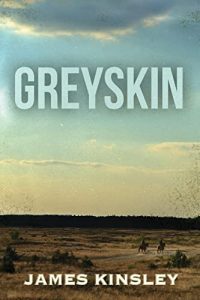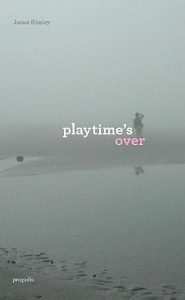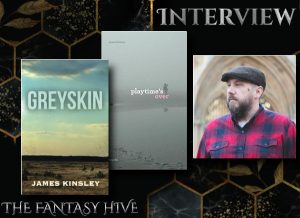Interview with James Kinsley (GREYSKIN)
The Witness, rather than the Protagonist.
Interview with James Kinsley
Kinsley’s first novella, Playtime’s Over, was published by Propolis in 2021. Playtime’s Over is the story of Will, a young man on the brink of taking his own life, who is taken on a journey of recollection and sensation by Viktor, the manifestation of the small voice at the back of Will’s mind. It was written as a response to Kinsley’s own mental health issues and worldview, using a fictional format to examine, and hopefully process, his own depression and anxiety. It’s also a love letter to his home city of Norwich.
His second book, Greyskin is now out from Deixis Press. Greyskin is a fantasy western, a collection of interwoven settlers tales that paint a picture of the colonisation of a newly discovered continent and the fate of the indigenous people who live there, as well as delivering a rich streak of action and adventure.
You can find Kinsley on Instagram @unclekins.
LN: Hello James, and welcome to The Fantasy Hive. Thank you so much for agreeing to take part in this interview! What I would love to talk about today, are the books I have read, the books I have not read, and to learn more about you!
First of all, you write Science Fiction under your pen name Ray Adams, and other fiction under James Kinsley – what is the reason for this? Why did you choose these names to separate these genres?
Kinsley: It isn’t about the genre separation, it is about self publishing and traditional publishing. So, I self publish ‘Ray Adams,’ I was tentative and anxious about putting myself out there and doing it under a different name made it a bit easier. When the opportunity to publish Playtime came along, I toyed with the idea of sticking with Ray Adams or going with another name, then I figured it might be the opportunity to see my name on a book. After this it seemed sensible to have the self published books under Ray Adams and traditionally published books under James Kinsely.
To start us off, tell us a little something about your writing process – do you have a certain method? Do you find music helps? Give us a glimpse into your world!
I work part time (four days a week), Monday is my writing day. I’m working on the books all the time, but I sit at the laptop once a week to get what’s up here (points to head) out. So, when I come to Monday, I have had a week since the last time I wrote and during that time I have figured out where I am going with the narrative. I write from beginning to end, the first sentence I write is the first sentence of the novel, and the last sentence is the last.
I don’t really ‘plan’ either, I just sort of ‘write,’ I usually have an end scene that I am working towards. I don’t think I could write everyday.
With the Ray Adams books, I do national novel writing month, so I have got into the habit of writing a book in November (/December/January) and then the rest of the year I am working on James Kinsley texts.
 What was your goal with Greyskin?
What was your goal with Greyskin?
I kind of got fixated with that literary theory – that there are only 7 stories – and I thought to myself ‘right, I am going to write one of each, and if I never write anything again I can still say I have ticked everything off.’ So, it started off as a collection of 8 stories, one of each trope and then the epilogue to put them together. So, that was my starting point, then I was invited to provide a cover quote for the ‘Workshop of Filthy Creations,’ that Deixis Press put out a few years ago, and in return for doing so, Angel (Deixis Press Owner) said she would take a look at some work. So, I sent Greyskin. She came back saying it’s brilliant, but that it would be difficult to sell because it is short stories and mixed genre. So, mainstream publishers probably aren’t going to want to touch it. We stayed in touch and about a year and a half ago she decided we could go ahead and publish.
There is nothing unusual about publishing a short story collection, I have certainly read several recently that are recent publications, like ‘Dead Relatives,’ ‘Eyes, Guts, throat, bones,’ which are a mixed bag in terms of genre and they are popular!
I think the hybrid thing – being fantasy and western – she was probably thinking that short story collections might be a bit of risk for larger publishers, and might not be certain on how they would market something like this. Angel asked me to write a few more stories within the collection to expand it, there was a number of characters who needed more narrative and she offered suggestions of things we could explore. I feel really lucky to have worked with Deixis Press, all the books they are putting out are exceptional, [Angel] has such an eye for material, you know, it is not just being published, it is being published by her that has made it amazing, likewise with Henry at Propolis, he knows what he is talking about! In both cases it has been a really huge boost of confidence, and I have learned so much from both of them.
Who is your fave character? And why?
Rose Eckles – the young widow running her farm, she was just a joy to write, in terms of being a role model, the capability, the way she stands up to the militia… I hope I have created a good strong pair of female characters there who hold their own against everything else they are involved in; really done, that is, because I didn’t try to, I just tried to write people, characters, the fact they were women was actually immaterial of writing them, and I think that is where sometimes male writers might fall down because they are trying to write ‘female’ characters and then create something unrealistic.
For me, her story is one of the better ones and one of my highlights, even though it is longer. I was quite insistent this story should come near the end because there is so much of Grimshanks’ story that is explained in this story – to have this any earlier would have short changed him. I think it was important for us to see who he becomes, then review how he became that way.
I really enjoyed how there was this sudden realisation that these ‘different characters,’ due to the different names and identities he has throughout his life, were all actually Grimshanks.
Yeah, it works because whilst he is the one unifying character that goes through the entire book, I was adamant from the start, even when it was just the 7 original stories, he was not going to be the main character of all the stories. I wanted him to be the thread that kept it all together, it was a deliberate ploy to just have him in the background of a story, or in one scene, so you know you are operating in the same world but at the same time it isn’t just this one character’s story. What you are actually seeing is the story of this continent and this colonisation and this society and culture spreading, but you see it through the eyes of this one person who just happens to be a witness to it all. That is his purpose, as a witness rather than the protagonist.
 Your writing is vibrant and refreshingly addictive, although you are confronting quite heavy concepts of living and emotions connected with being-human (not to mention a cocktail of speculative fiction, postcolonialism and greed). Did you find it challenging to keep your writing from becoming monotonous and depressing?
Your writing is vibrant and refreshingly addictive, although you are confronting quite heavy concepts of living and emotions connected with being-human (not to mention a cocktail of speculative fiction, postcolonialism and greed). Did you find it challenging to keep your writing from becoming monotonous and depressing?
Not really. Looking at how I put Playtime’s Over together, being the most strident example of that, I suffer from clinical depression (hereditary) and that book was very personal. It is not autobiographical, Will is very different to me. However, I do see him as possibly the version that there could have been if I hadn’t had the same support network. So, when I was writing this, I was very conscious that I wanted it to be funny, because I think that humour is a great way of connecting and engaging with people, especially with such topics. If it is ‘just bleak’ I know I wouldn’t want to read it. It makes it much more palatable, by injecting this topic with humour.
Playtime is a very grounded novel, even the tiniest details that everyone can relate to, offering the comfortability and warmth that Will clings to, like the cup of tea, the cigarette, serious and relatable but also had a comic relief value that really works.
What is the one thing you hope readers take away from your writing?
Predominantly, enjoyment!
Nailed it!
I think that has to come first, crucially, I think because I write about things like mental health, and there is quite a lot of politics in Playtime and Greyskin, and I certainly have plans in my science fiction to take some of those characters and handling environmental issue as well. I think it so much more important if you are writing something with a message you want to communicate with people, you have to start with enjoyment, it can’t be one or the other. You need engagement first!
Tell us more about the entity in ‘From within, a Darkness’ – For me there was some very clear allusions to Arthur C Clarkes 2001: Odyssey, Dr Who and Space Opera narrations – for you – what is the entity and the story behind it? Or is the mystery part of the fun?
I have no intention of revisiting the entity at all, because they killed it. The mystery is the fun, and part of trying to keep it grounded. I can’t see a good reason a bunch of miners and this rogue crew, why they would be able to work it out? The entity is so ancient, how could they possibly work it out? And why would they want to? They just need to leave?
They are not Doctor Who, they aren’t here to solve the problem, they just need to escape.
I know that is frustrating for readers, but it isn’t something the characters can pin down, they aren’t going around solving mysteries, they just need to survive.
One of our favourite questions here on the Fantasy Hive: which fantastical creature would you ride into battle and why?
HAH! Something fast and preferably going in the opposite direction…
Something that can fly, going in the opposite direction… dragon!
Finally, where can we recommend readers buy your book?
Amazon – Ray Adams novels
Playtime & Greyskin – independent Highstreet bookshops

